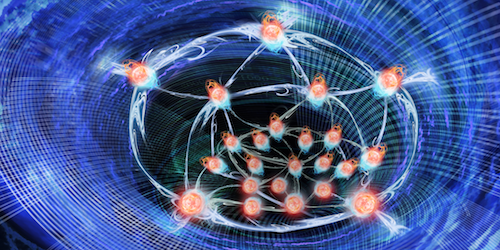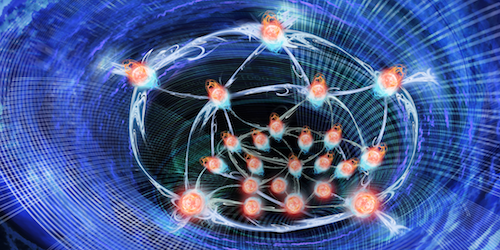Quantum Droplets Swell to a Macrodrop
Ultracold atoms can exhibit quantum behavior that mimics superfluids and superconductors. Tuning the atom-atom interactions can also reveal never-before-seen phases of matter. Following this approach, researchers working with magnetic atoms in a cigar-shaped trap have generated a single liquid-like macrodroplet, containing 20 times more atoms than in previously observed droplets. The experiment demonstrates that the stability of these droplets is due to quantum fluctuations.
When trapped atoms are cooled to near absolute zero, they form a Bose-Einstein condensate (BEC), in which their wave functions become coherent. The BEC is a macroscopic quantum object, but some of its quantum behaviors (such as quantum fluctuations) are difficult to observe because their effects are small compared to the mean-field interaction energy in this dilute system. For this reason, researchers are eager to reach parameter regimes where quantum fluctuations reveal themselves.
One way to explore BEC quantum fluctuations is to crank up the strength of interactions, but this can reduce the BEC lifetime. Another option is to use magnetic atoms, in which the attractive magnetic dipole interaction cancels the repulsive contact interaction, allowing quantum effects to dictate the physics. Recent work with dysprosium atoms found that this cancellation leads to a fragmentation of the BEC into several quantum droplets, each containing about 800 atoms. Lauriane Chomaz and Francesca Ferlaino of the University of Innsbruck along with their colleagues have now performed similar experiments with erbium atoms. When dipolar and contact interactions were roughly balanced, the system transformed into a single droplet of 20,000 atoms. Observations of the macrodroplet agreed with the team’s theoretical model, proving that quantum fluctuations provide a stabilizing pressure that prevents implosion. The authors believe these droplets could provide special insight into the physics of superfluid helium.
This research is published in Physical Review X.
–Michael Schirber
Michael Schirber is a Corresponding Editor for Physics based in Lyon, France.





